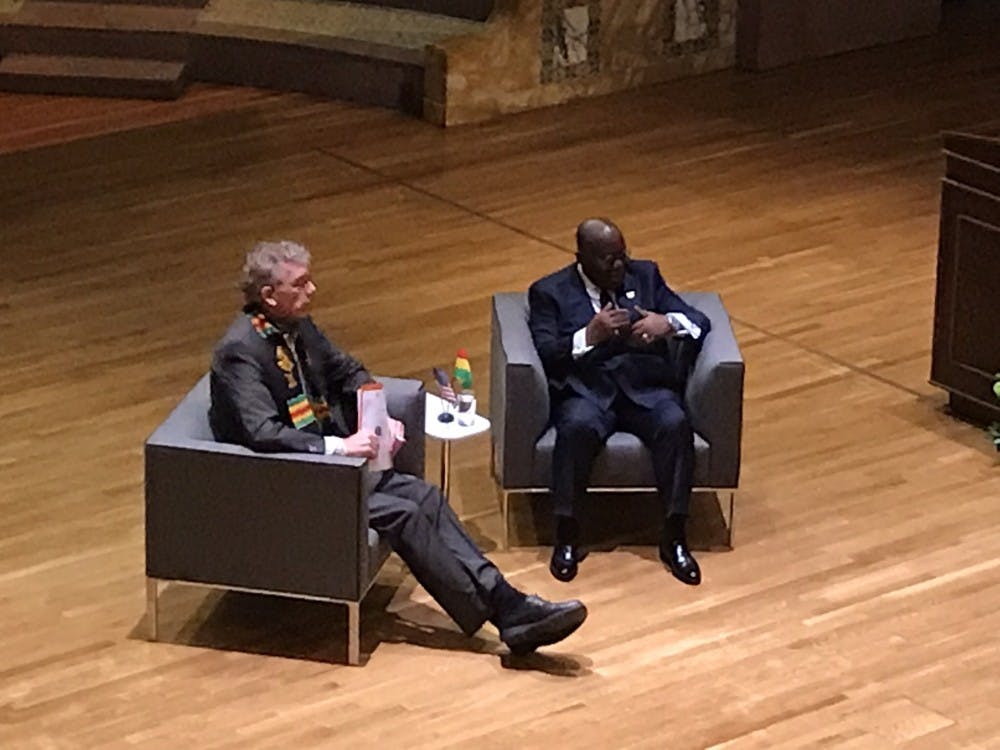On Friday, Sept. 20, on the stage of a Richardson Auditorium brimming with students, faculty, and community members, His Excellency Nana Akufo-Addo, President of the Republic of Ghana, spoke with Program in African Studies Acting Director and Professor of History Emmanuel Kreike about his presidential goals, the barriers to Ghana’s development, and the African Union’s role in continental development.
At the start of the event, Kreike briefly introduced the president, solemnly stating that Akufo-Addo ascended to the presidency in 2016 at the start of “a global future that is African.”
Kreike highlighted Akufo-Addo’s previous political experience in Ghana, including his role as Attorney General from 2001 to 2003 and Minister for Foreign Affairs from 2003 to 2007. He also emphasized Akufo-Addo’s devotion to national education.
“The president sees education, in particular high school education, as the key to economic development,” Kreike said. “His objective is free education from preschool to, and including, high school for every Ghanaian. One of the first laws he introduced after taking office was to make secondary schools free for all.”
Akufo-Addo took the podium following the introduction and explained the need for continental unity and development among the African Union.
“We cannot be proud when nearly 413 million of the population of Sub-Saharan Africa are impoverished,” Akufo-Addo said. “There are 114 million African youths being unemployed, and 89 million children of school-going age out of school.”
To combat these issues within Ghana, Akufo-Addo outlined his plans to target illicit mining, decrease foreign resource exploitation, and restructure the national budget and employment policies, pointing to the Ghanaian devotion to and increased interest in democracy.
“The Ghanaians have manifested in this era a deep attachment to the principles of democratic accountability, respect for liberties, and human rights,” Akufo-Addo explained.

Akufo-Addo described this year as “the year of return” for Africa, referencing the 400th anniversary of the first documented slave importation to the United States in 1619.
“We intend to use the symbolism of the year of return to bring together in Ghana Africans, persons of African descent, and all well-wishers and lovers of freedom,” Akufo-Addo said. “We’re also using the commemoration to deepen the ties in Africa of their kith and kin.”
Following his speech, Akufo-Addo answered questions from the audience concerning topics such as continental peace, refugee crises in much of Africa, and universal healthcare.
Prior to the public lecture, Akufo-Addo met with approximately 30 undergraduate and graduate students of Ghanaian heritage in Richardson’s basement lounge to engage in a more intimate conversation. Justin Hinson ’21 was among the undergraduates present.

“It was nice to hear him speak up close in a rather comfortable setting,” Hinson said. “I really wanted to have a meaningful experience related to my cultural heritage, given that since I’ve grown up in the States, I never really had that.”
“It makes you proud to say that you met the most important political figure of a country that you care deeply about,” Hinson said.
Months of planning went into Akufo-Addo’s visit, which was originally slated to be included in the University’s inaugural Africa Summit, held in April 2019.
Africa Summit co-director Blessing Jegede ’21 explained that the Ghanaian president was to speak at the two-day conference, but had to cancel at the last minute. After Akufo-Addo confirmed the revised date, Jegede, along with the rest of the conference team, devoted significant time over the summer to ironing out the details of his fall visit, dealing with many different time zones and internship schedules.
“We had to deal with logistics and come up with a production plan,” Jegede said. “We had to worry about where [Akufo-Addo] would be at every minute of his visit.”
Next fall, Jegede hopes to host another African head of state in a leadership series to bring more attention to African studies as a discipline and as a crucial component of international policy.
“It’s meant to be a learning space for everyone,” Jegede said. “More than 670 tickets were [claimed] for this conversation. It means that we have people’s attention.”
“A Conversation with Nana Addo Dankwa Akufo-Addo, President of Ghana” was co-sponsored by the Program in African Studies, Africa Summit Princeton, Princeton in Africa, the Princeton Institute for International and Regional Studies (PIIRS), the Julis-Rabinowitz Center for Public Policy and Finance, Innovations for Successful Societies (ISS), and the Liechtenstein Institute on Self-Determination (LISD).








